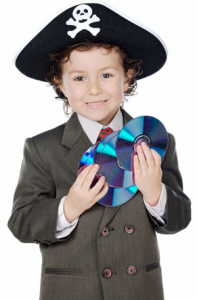6 Strikes And You're Out
posted in: Music News
Ever since Napster first launched in 1999, piracy has been the music industry’s worst nightmare. With drastic drops in sales and revenues over the last decade, record labels are desperate to try and find ways to stop people from downloading music for free on the internet. Last week, the music and film industries announced a deal with five major major Internet Service Providers in hopes of discouraging piracy; wherein users caught illegally downloading copyrighted material will be given a series of six warnings to cease and desist. Repeat offenders could be subject to slower internet speeds or, if they reach the sixth strike, a ban from the company’s internet service. The five ISP’s involved in the deal, AT&T, Cablevision, Comcast, Verizon, and Time Warner Cable, comprise a vast majority of internet users in the U.S.

Even little kids know how to pirate music these days
Record labels hope that this deal will help put a stop to music piracy, but it might be too little too late. The deal mainly focuses on peer-to-peer file sharing programs like BitTorrent, but there are plenty of other ways for people to download free music and evade detection. Tech savvy music pirates will always try and find a new way to cheat the system, and they will always be one step ahead of the Internet Service Providers trying to play catchup. It appears that the war on music piracy might be un-winnable.
Plus, consumers have had the advent of free music for the last ten years. Slowing down someone’s internet connection or banning them from the internet altogether isn’t going to translate into album sales. What the record labels should be doing is jumping on the free streaming bandwagon. Websites like Pandora and Spotify allow users to stream music for free, with the occasional advertisement popping up between songs. These companies then use the ad revenue to pay artists based on the number of streams they receive. Sure, each stream may only produce a cent or less for each artist, but some money is better than no money, right? And with Spotify’s U.S. launch right around the corner, and with an estimated 50 million users expected for its first year alone, there is sure to be a number of high profile companies who want to reach that advertising demographic. And that means more money in the hands of artists. It’s a win-win, artists and labels get paid, and consumers get their music for free. And no one has to get kicked off the internet.
